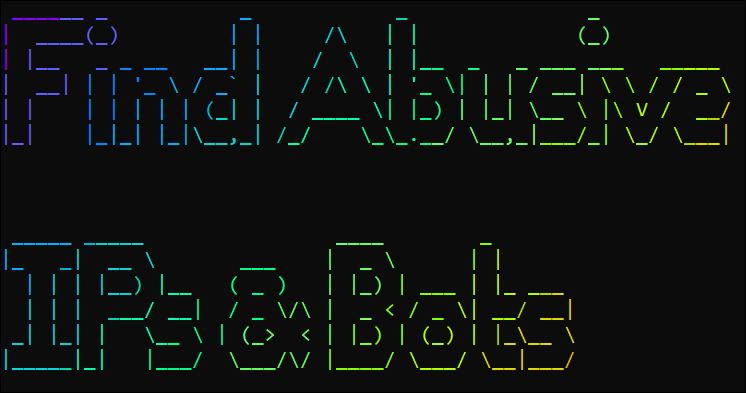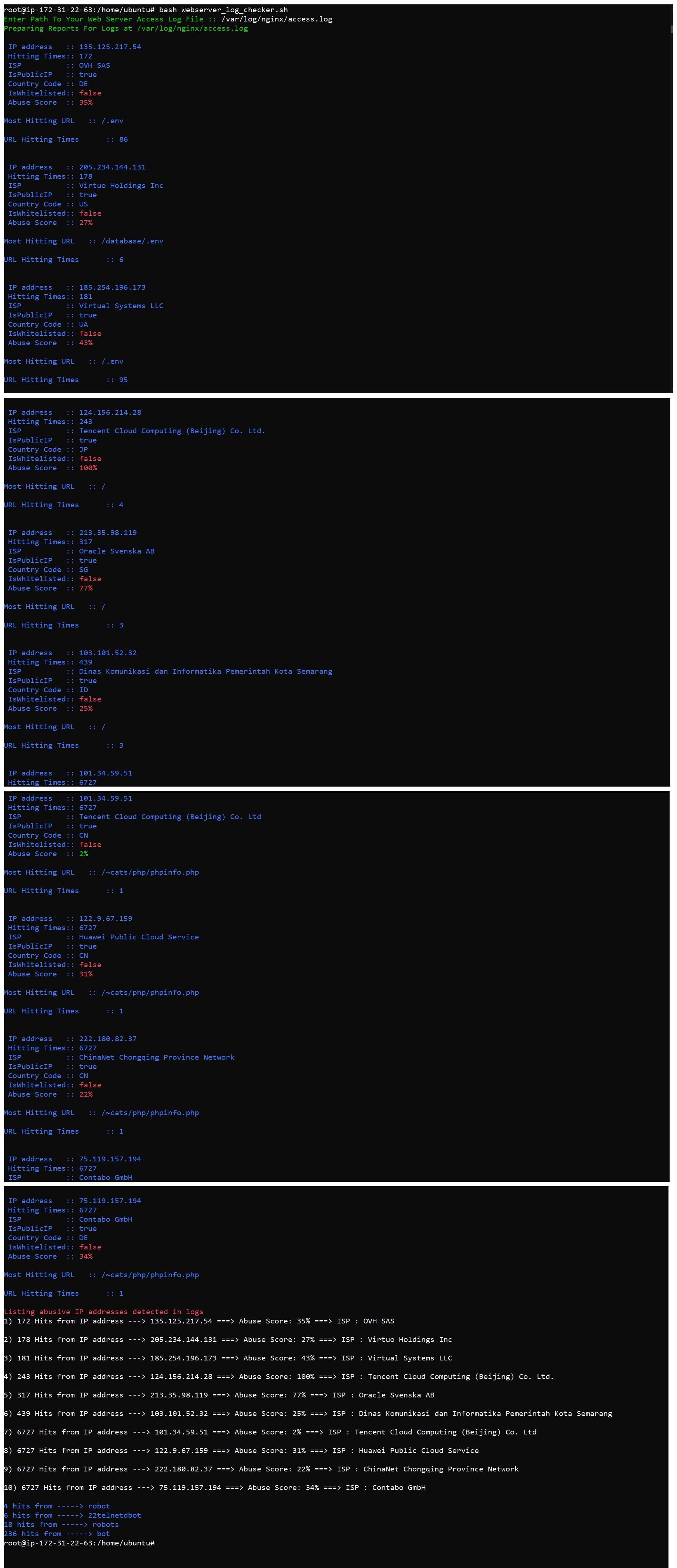Automatically Detect Abusive IPs and Bots in 'NGINX / APACHE' Logs Using Bash Script
 Sachin Yalagudkar
Sachin Yalagudkar
Introduction
Monitoring NGINX and APACHE web servers logs for abusive IPs and excessive hits of bots is crucial for maintaining the security and performance of your web server.
Manually checking logs can be time-consuming and error-prone. Automating this process with a custom script can save time, reduce errors, and enhance your server’s security posture.
In this post, we’ll explore a bash script designed to automate the analysis of webserver access logs, helping you to identify abusive behavior and bots effectively especially of E-Commerce platform Websites and webservers.
Purpose and Benefits
The primary purpose of this script is to streamline the process of monitoring webservers access logs by:
Identifying Abusive IPs: Detect IP addresses with a high number of requests, indicating abusive behavior or potential attacks.
Detecting Bots: Identify and analyze requests from known bots or scrapers to help filter or block unwanted automated traffic.
Providing Detailed Reports: Generate detailed reports on abusive IPs and bots to help you make informed decisions on mitigating malicious traffic.
Benefits for Day-to-Day Activities:
Time Efficiency: Automates log analysis, saving time for other tasks.
Enhanced Security: Quickly identifies threats and abnormal behavior, allowing timely server security actions.
Accurate Reporting: Delivers detailed reports on abuse and bot activity, helping understand traffic patterns and take proactive measures.
Script Overview
Here’s a breakdown of the script and its functionality:
User Input:
The script prompts the user to enter the path to the NGINX access log file.
It verifies the existence of the log file before proceeding.
Abusive IP Detection:
It analyzes IP addresses with the highest request counts to identify potential abusive behavior.
Uses the AbuseIPDB API to check the reputation of these IPs and provides detailed reports, including abuse scores and ISP information.
Bot Detection:
Searches for known bot patterns in the logs.
Generates a report on bot activity, showing the number of hits from each detected bot.
Detailed Reporting:
Lists abusive IP addresses and their hit counts.
Provides a summary of the most hit URLs associated with these IPs.
How to Use the Script
Save the Script: Save the provided bash script to a file, for example,
webserver_log_checker.shnano webserver_log_checker.shCopy the below BASH Script:
#!/usr/bin/bash api_key="e378a55f27d99f9c0b70c00925df8b4170454cfe94313e289b3a3aa29c9857c2d9a29e633506a23e" check_url() { check_url=$(grep -iw "$1" "$log_path" | awk '{ print $7 }' | sort | uniq -c | sort -k1 -n | tail -n 1) url=$(echo $check_url | awk '{ print $2 }') count=$(echo $check_url | awk '{ print $1 }') echo -e "\e[1;34mMost Hitting URL :: $url\n\nURL Hitting Times :: $count\n\e[0m" } check_ip() { jsondata=$(curl -ks -G https://api.abuseipdb.com/api/v2/check \ --data-urlencode "ipAddress=$1" \ -d maxAgeInDays=90 \ -d verbose \ -H "Key: $api_key" \ -H "Accept: application/json") ip=$(echo $jsondata | grep -oP '(?<="ipAddress":")[^"]*') isp=$(echo $jsondata | grep -oP '(?<="isp":")[^"]*') ispubip=$(echo $jsondata | grep -oP '(?<="isPublic":)[^,]*') countrycode=$(echo $jsondata | grep -oP '(?<="countryCode":")[^"]*') iswhitelisted=$(echo $jsondata | grep -oP '(?<="isWhitelisted":)[^,]*') abusecore=$(echo $jsondata | grep -oP '(?<="abuseConfidenceScore":)[^,]*') [[ -z $abusecore ]] && abusecore=0 color="\e[1;32m"; colort="\e[1;32m"; colorc="\e[1;32m" [[ $iswhitelisted == "false" ]] && color="\e[1;31m" [[ $abusecore -gt 20 ]] && colorc="\e[1;31m" [[ $abusecore -gt 0 ]] && abuse_ips+=("$ip ===> Abuse Score: $abusecore% ===> ISP : $isp") echo -e "\e[1;34m IP address :: $ip Hitting Times:: $2 ISP :: $isp IsPublicIP :: $ispubip Country Code :: $countrycode IsWhitelisted:: ${color}${iswhitelisted}\e[1;34m Abuse Score :: ${colorc}${abusecore}%\e[1;34m \e[0m" check_url $ip } list_abuse_ips() { echo -e "\e[1;31mListing abusive IP addresses detected in logs\e[0m" n=1 for ip_info in "${abuse_ips[@]}"; do ip_address=$(echo $ip_info | awk '{print $1}') hits=$(grep -c "$ip_address" "$log_path") echo -e "$n) $hits Hits from IP address ---> $ip_info\n" n=$(( n+1 )) done } check_bots() { for bots in $(grep -oh -E "\w*Bot\w*|\w*bot\w*|\w*Bytespider" "$log_path" | sort | uniq -c | sort -k1 -n | tail -10 | awk '{ print $1 ":" $2 }'); do count=$(echo $bots | awk -F : '{ print $1 }') bot=$(echo $bots | awk -F : '{ print $2 }') echo -e "\e[1;34m$count hits from -----> $bot\e[0m" done } check_ips() { abuse_ips=() for ips in $(awk '{print $1}' "$log_path" | sort | uniq -c | sort -k1 -n | tail -n 10 | awk '{ print $1 ":" $2 }'); do count=$(echo $ips | awk -F : '{ print $1 }') ip=$(echo $ips | awk -F : '{ print $2 }') check_ip $ip $count done if [[ ${#abuse_ips[@]} -gt 0 ]]; then list_abuse_ips else echo -e "\e[1;32mNo Abuse IP Address found in logs\e[0m" fi } choose_log_path() { read -p $'\e[1;32mEnter Path To Your Web Server Access Log File :: \e[0m' log_path if [[ -f "$log_path" ]]; then echo -e "\e[1;32mPreparing Reports For Logs at $log_path\e[0m" check_ips check_bots else echo -e "\e[1;31mLog file not found at the specified path. Please try again.\e[0m" && choose_log_path fi } main() { choose_log_path } main $@Make the Script Executable:
chmod +x webserver_log_checker.shRun the Script: Execute the script by providing the path to your NGINX access log file:
./webserver_log_checker.shReview the Output:
The script will display the most hitting URLs, details about abusive IPs, and bot activity.
Review the generated reports to take necessary actions, such as blocking abusive IPs or filtering bots.

Summary
This bash script helps system administrators and security professionals manage Linux-based web servers by automating log analysis to quickly identify and mitigate abusive traffic and bot activity, enhancing server security and performance.
Feel free to Test and Customize the script according to your specific needs and use it as a part of your server management toolkit.
Subscribe to my newsletter
Read articles from Sachin Yalagudkar directly inside your inbox. Subscribe to the newsletter, and don't miss out.
Written by
